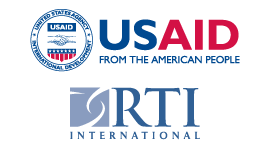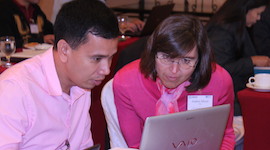Case Writing Workshop Returns To The Philippines For Third Cohort
Thursday, March 24, 2016
Julie Felker, who will lead a WDI case writing workshop in the Philippines in April, said writing a business case is like penning a detective novel.

“There are many unknowns, information is not always clear, and students have to put the pieces together to solve the mystery – meaning, make a decision,” she said. “And it requires multiple drafts. You never get it right the first time.”
The three-day workshop is part of the Science, Technology, Research and Innovation for Development – or, STRIDE – initiative, a five-year, multimillion-dollar effort funded by the United States Agency for International Development (USAID) in partnership with RTI International. Its goal is to foster economic growth and development in the Philippines through support of education, research and industry partnerships in high-growth economic fields, including science and technology.
This is the third case writing workshop WDI has organized and delivered, and the first one led by Felker, a WDI case writing consultant and former associate dean at the University of Michigan-Dearborn College of Business.
Thirty-five professors from a variety of disciplines will attend the April 6-8 workshop in Iloilo City, a member city of the USAID Philippines’ Cities Development Initiative (CDI). The two previous workshops were held in the capital city of Manila; the new location better incorporates the experience and input of professors at universities outside of Manila, organizers said.

WDI case writing consultant Andrea Meyer, right, helps a professor with his business case at an April 2015 workshop in Manila.
Each of the faculty members will arrive at the workshop with an idea for a case study that examines companies or organizations in the Philippines. Over the three days, Felker and WDI case writing consultant Andrea Meyer will help the professors begin writing an effective case study. After the workshop, the professors will get editorial guidance from the WDI Publishing staff.
Completed cases will be featured on the Philippines Case Collection hosted by WDI Publishing and available for free to faculty in the Philippines and other universities around the world. To date, 41 cases and mini-cases written by previous workshop participants are available.
The cases are some of the first to be written by Filipino professors about domestic companies, and discuss the challenges and successes of companies and organizations in a variety of fields – including health care, software, ecotourism, microfinance, marketing and many others. The cases will help prepare students for careers in these high-growth sectors by exposing them to real-life challenges and dilemmas of Filipino companies, and encouraging them to use creative problem-solving skills.
On the workshop’s first day, Felker will discuss situating cases and the case teaching method into the broader curriculum. She will talk with the participants about learning goals, the case writing process, case topics, how to approach and work with organizations, conducting research and doing interviews.
On the second day, participants will go through components of a case, including protagonist, introduction, organizational background, industry/competitive overview, problems and challenges. Participants will then work individually on each section, share their ideas in small groups, then the class will get back together to discuss. Felker and Meyer will provide advice and feedback individually and to the class as a whole.
On the final day, participants will have some time to work on different case components, do some writing and conduct research. Felker also will talk about teaching using the case method. And plans are being made for previous workshop participants to speak to the current cohort about their case writing experience.
“The writing process in many ways is unique to each individual – where they write, how much they write at any given time, how they organize their ideas,” Felker said. “However, case writing is quite systematic and requires a plan of action.”
Like that detective novel, Felker said writing a case study is about telling a story – but with a common structure. A writer must know his or her audience – in this case, students – and what knowledge skills and abilities they have.
“At the core of case writing are learning objectives,” she said. “Before they start writing, case writers must articulate the desired learning outcomes students should acquire through analysis of the case. For example, what should students know, what should they be able to do, and what should they be thinking about?”
Felker said she is excited to be a part of the STRIDE project and the case writing portion of it. Daniel DeValve, project administrator for WDI’s Development Consulting Services, which oversees the institute’s work on the project, said the workshop is popular with faculty in the Philippines. More than 80 applied for this workshop.
“The STRIDE case study workshop has proven successful in motivating university professors from a variety of disciplines to incorporate real-life examples into their classrooms, which, in turn, serves to better prepare students for employment fields such as management, business and technology,” DeValve said. “Professors have reported that the process has improved both their writing and teaching styles, and many have expressed strong interest in publishing additional case studies in the future.”
